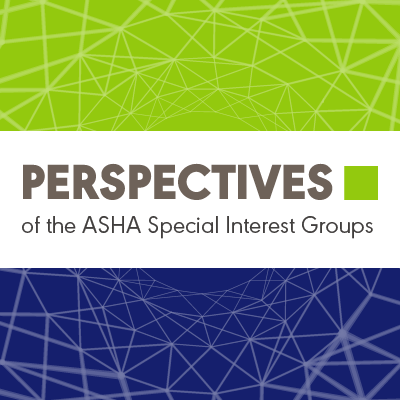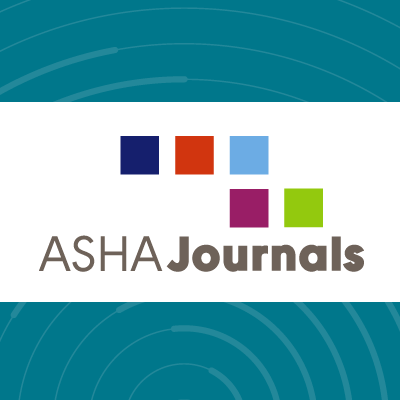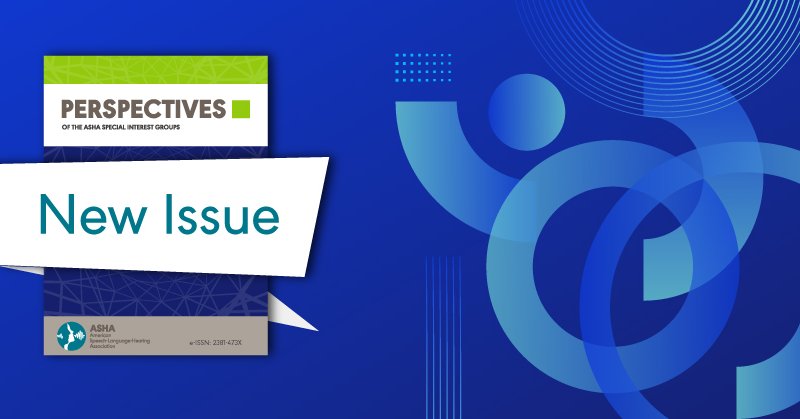
SIGPerspectives
@SIGPerspectives
Followers
2K
Following
435
Media
203
Statuses
4K
Official Twitter account of Perspectives, a publication of ASHA's Special Interest Groups.
Rockville, MD
Joined February 2016
Measuring speech intelligibility is crucial to assessing and managing dysarthria. This article from #ASHASIG19 explores how advances in artificial intelligence can help create cross-language intelligibility assessments https://t.co/EABfP7mYLg
@CarnegieMellon @ASU #SLPeeps
pubs.asha.org
Purpose: Speech intelligibility is a critical outcome in the assessment and management of dysarthria, yet most research and clinical practices ha...
0
0
0
As Convention approaches, we're announcing once again the winners of the ASHA Journals Awards! CONGRATS to all & to Kawana Award Winner Dr. Sumit Dhar. Thanks for choosing to publish & work with ASHA Journals. See you @ Convention! https://t.co/hOyjtjuzCt
@SIGPerspectives
academy.pubs.asha.org
We’re pleased to announce the 2025 ASHA Journals Awards! The annual awards encompass two categories: (1) The Alfred K. Kawana Award for Lifetime Achievement in Publications and (2) the Editor’s...
0
1
1
In speech, language, and hearing sciences, new terms provide increased accuracy when describing the grammars of children with and without Developmental Language Disorder (DLD) across dialects of English. https://t.co/AAt3vanPl3
@SIGPerspectives @CSDisseminate #SLPeeps #slp2b
pubs.asha.org
Purpose: The purpose of this article is to encourage the adoption of five grammar terms within the field of speech, language, and hearing science...
0
1
1
Aphasia support groups can help facilitate sustainable aphasia management and enhance quality of life. This article from #ASHASIG2 discusses the development of an accessible support group for Korean-speaking people with aphasia https://t.co/s4u9z6EhFp
@PurdueSLHS @TouroHealthSci
pubs.asha.org
Purpose: Aphasia support groups serve as an important role in facilitating sustainable aphasia management and enhancing quality of life. With rap...
0
1
2
#ResearchTuesday! When working with children with residual speech sound disorder, biofeedback may be more effective than traditional speech therapy. Learn more: https://t.co/mZNxDjV2S9
@ASHAJournals @SIGPerspectives @CSDisseminate #SLPeeps
0
1
2
In Case You Missed It, the October issue of Perspectives contains more than 20 articles from across the Special Interest Groups. Learn more about the issue on the Context Blog!
academy.pubs.asha.org
We can’t believe it’s already October! If you’ve made personal goals to read about advances in your specialty area this year, there’s still time—and, even better, we’re making it easier for you....
0
0
0
Visual speech cues can help people understand each other. This article from #ASHASIG14 examines if SLPs rated speech samples of bilingual children differently when they could see the child speaking https://t.co/qwdtCecYgF
@Augustana_IL #SLPeeps #SLP2Be
pubs.asha.org
Purpose: Overall, seeing a speaker results in higher intelligibility than hearing speech alone because of visual speech cues. Intelligibility rat...
0
0
1
We're highlighting some of our trending resources on Developmental Language Disorder #DevLangDis ahead of DLD Awareness Day. Check out these articles from across our journals! https://t.co/SQXuieaEq7
#DLDday
academy.pubs.asha.org
Developmental language disorder (DLD) can be challenging for school-based speech-language pathologists (SLPs)—because DLD can’t be seen. The hidden nature of this disorder has inspired the theme of...
0
2
3
SLPs worldwide show major differences in how they assess & treat bulbar symptoms in #ALS. Standardized guidelines are urgently needed. #SLPeeps #Research
https://t.co/GJ5KOyBM4h
@alsassociation @ALSHF @NSUFlorida @PittCSD @everything_als @BostonChildrens @SIGPerspectives
pubs.asha.org
Background: Speech-language pathologists (SLPs) evaluate and treat swallowing and communication impairments in individuals with amyotrophic later...
0
1
4
#JSHLR study results provide novel evidence that metrics related to contextualized word choices capture variance in degree of cognitive decline in people with Alzheimer's disease. https://t.co/YLqQcn6D7H
@SIGPerspectives @CSDisseminate @nyuniversity @rotmanresearch @IBMResearch
pubs.asha.org
Purpose: Early detection is critical for effective management of Alzheimer's disease (AD) and other dementias. One promising approach for predict...
0
2
1
It's #ResearchTuesday! As the number of adults with dysphagia continues to grow, education and interprofessional practice can ensure all health care professionals have the information they need. Learn more: https://t.co/6eaPGJkjuN
@ASHAJournals @SIGPerspectives @CSDisseminate
0
1
3
Children of color and their families encounter a variety of barriers accessing AAC that could help them communicate in schools. Read about a novel framework to help assess the communication needs of these families in the latest from #ASHASIG12
https://t.co/MRP4YtB18p
@penn_state
pubs.asha.org
Speech and language impairment is the second most common disability category for which children are served in public schools under the Individuals...
0
0
2
This study examined whether bilingualism affords a perceptual advantage in understanding dysarthric speech, and whether working memory and vocabulary knowledge contribute to that advantage. https://t.co/GmGmLn8ezQ
pubs.asha.org
Purpose: Despite the prevalence of bilingualism, research on the understanding of disordered speech has focused almost exclusively on monolingual...
0
1
2
This study describes the experience of a first hearing aid fitting from the perspective of adults with hearing loss and their relatives, and it also identifies facilitators and barriers to the fitting process. https://t.co/q1rtGirxHN
pubs.asha.org
Purpose: This study is the first step in a project aimed at developing an intervention program for new hearing aid (HA) users and their relatives...
0
2
2
Study highlights the critical role of vocal cues, particularly confidence, in shaping perceptions of speaker credibility. These cues not only affect final credibility judgments--they also shape the dynamic reasoning process involved in social inference.
pubs.asha.org
Purpose: This study aimed to explore how vocal cues of confidence and gender influence the dynamic mechanisms involved in reasoning about speaker...
1
2
5
The latest issue of Perspectives is now available online! Read more than 20 articles on neurogenic disorders, swallowing, audiology, and more in the October issue! https://t.co/EpVspVxvH5
0
0
1
Hearing aids are the primary treatment for age-related hearing loss--but they're vastly underutilized. #AJA researchers explored cross-sectional associations between predisposing, enabling, and need factors as well as hours of daily hearing aid use.
pubs.asha.org
Purpose: Hearing aids are the primary treatment for age-related hearing loss but are vastly underutilized. We explored cross-sectional associatio...
0
1
2
Veterans Health Administration (VHA) pilot study aimed to determine whether VHA could use automated audiometry w/ asynchronous telehealth systems to increase access points for aud. svcs to veterans across multiple VHA locations. https://t.co/ychjqFu6pz
@SIGPerspectives #AUDpeeps
pubs.asha.org
Purpose: In fiscal year 2020 (FY20), the Veterans Health Administration (VHA) initiated a pilot study to determine whether automated audiometry c...
0
1
2
People select and avoid certain foods for a variety of reasons. As adults age, they may select different foods, but could this be an early indicator of swallowing changes? @PittCSD @PittTweet @penn_state
https://t.co/q9qftlubyY
#ASHASIG13
pubs.asha.org
Purpose: People seek out or avoid foods and drinks based on multiple sensory preferences, including taste, smell, texture, temperature, and visco...
0
0
0
Psychosocial Status and Quality of Life in Patients With Ménière's Disease and Vestibular Migraine https://t.co/RGslIp8UH9
@SIGPerspectives @CSDisseminate #AUDPeeps #MenieresDisease #Menieres
pubs.asha.org
Purpose: The objective of this study was to evaluate anxiety, depression, dizziness disability, sleep, and quality of life in individuals diagnos...
0
1
2



















